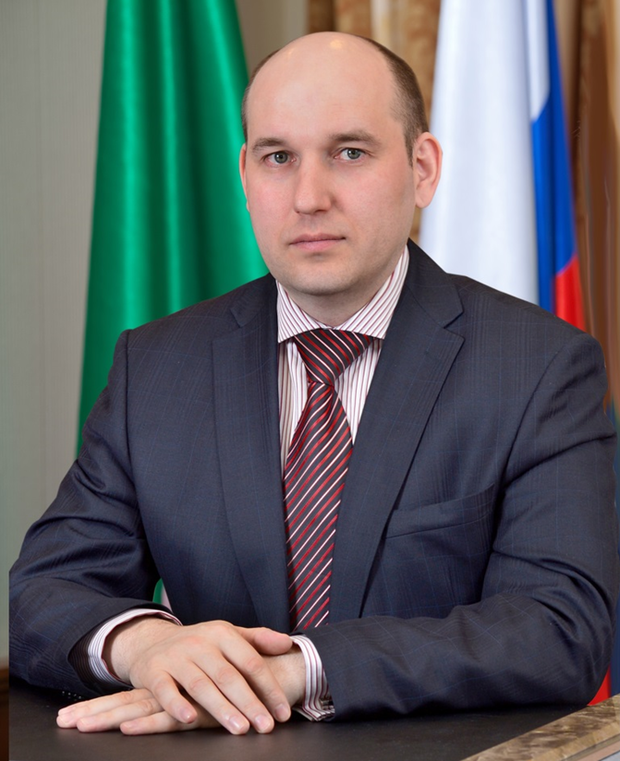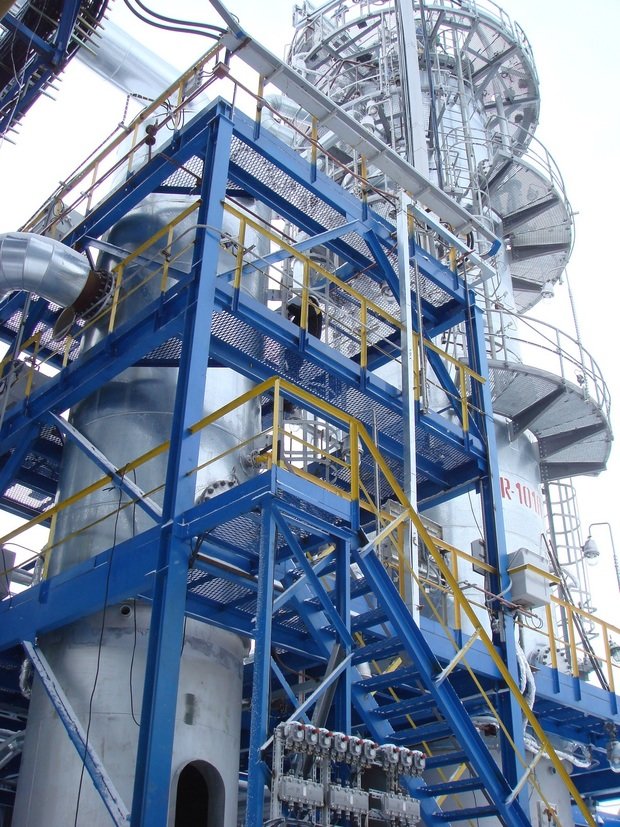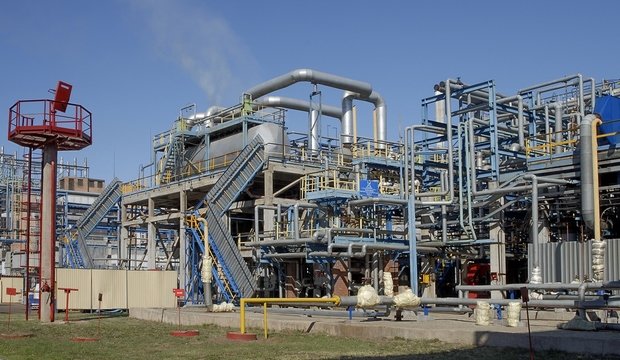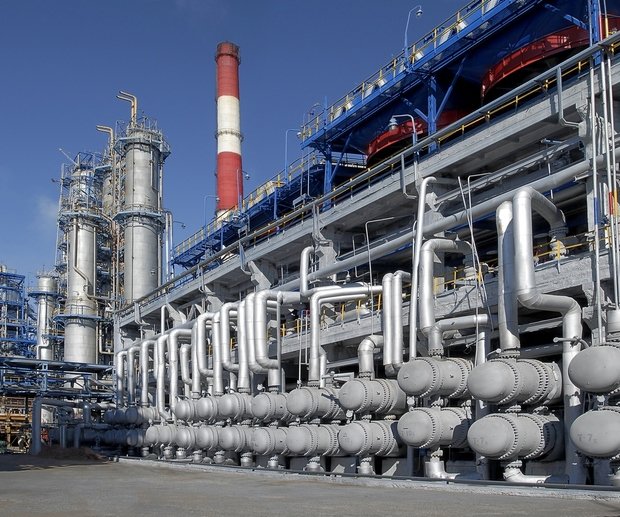Vladimir Lakhomov, TAIF-NK refinery director: ''Diesel fuel is a core product of the refinery''
TAIF-NK oil refinery launched the production of a new generation of bitumen for road construction and increased production of jet fuel in 2017. But the main work was the preparation for the launch of the Heavy Residue Conversion Complex, where they began to supply raw materials from the refinery. How the product range will change after the introduction into operation of the new object, how the refinery is solving the issue of bitumen ''seasonality'' – read in the interview of Realnoe Vremya with director of TAIF-NK oil refinery Vladimir Lakhomov.
Mr Lakhomov, how do you assess the work of the refinery in 2017?
In 2017, the refinery processed 7,63 million tonnes of raw material, including 7,4 million tonnes of desalted crude oil, 0,23 million tonnes of semi-finished products from the gasoline plant – it is a mixture of diesel fraction of gas condensate and light gas oil of the catalytic cracking unit. In 2017, the plant produced 1,09 million tonnes of straight-run gasoline, which serves as raw material for the ethylene plant of Nizhnekamskneftekhim PJSC, 126,000 tonnes of aviation fuel of RT brand, 1,96 million tonnes of summer diesel fuel and 210,000 tonnes of Euro 5 standard winter diesel fuel, 1,39 million tonnes of vacuum gas oil fraction. Besides, we have produced 67,000 tonnes of paving bitumen, 35,000 tonnes of sulphur pellets, 1,96 million tonnes of fuel oil.
Besides, the range of products has expanded — liquefied petroleum gas, which is sent to the new Heavy Residue Conversion Complex and polymer modified asphalt cement of PBV-60 grade. Without a doubt, polymer modified asphalt cement of PBV-60 grade can be called a new generation of bitumen for the construction of high-quality and long-lasting roads.

One of the products that is supplied directly from the refinery to consumers is diesel fuel. What types of diesel fuel does TAIF-NK produce?
Diesel fuel is one of the core products of the refinery. Last year, the refinery produced 2,17 million tonnes of Euro 5 diesel fuel. We produce summer grades with a maximum filterability temperature from minus 5 to minus 17 and winter grades with a maximum filterability temperature of minus 32 degrees Celsius. This is the minimum temperature at which diesel fuel is freely pumped through the fuel system filters of cars. Given the climate of our region, diesel engines are usually installed on commercial vehicles such as trucks and buses.
The refinery also produces aviation kerosene. What share does it occupy in the total production line and are there plans to increase the production volume of aviation kerosene?
Last year, the refinery produced 126,000 tonnes of commercial aviation fuel of RT brand, which is 2,7 times more than in 2016. We also plan to further increase the volume of production.
In contrast to the production of other commodity products of the refinery, the production of jet fuel has a number of features. The main difference is that the raw material is converted into jet fuel in periodic mode, that is, in stages. Before each stage, raw materials or semi-finished products are checked by chemical engineers of the refinery, and then specialists of the ministry of defence of the Russian Federation re-control them. In addition, not only all additives but also fuel that has already been shipped to rail tanks is subject to input control. It is checked before it leaves the territory of the plant. Also, during the production of aviation fuel, the specialists of the ministry of defence control the compliance of current parameters, the technology of its production and check the railway tanks that are used for transportation.
Who are the main consumers of jet fuel? And do the volumes of jet fuel production change during the summer season?
No, the volumes do not depend on a season, except that in winter period the equipment for the production of jet fuel is partially involved in the production of a lighter winter grade of diesel fuel. If we talk about the geography of supplies, jet fuel is in demand both in the domestic and foreign markets.
The range of products of the refinery also includes bitumen. How is the modernisation of bitumen production going and whether it is produced?
It is no secret that the asphalt concrete mixture, which is used in the construction of road surface, consists of inert materials — crushed stone, sand, small screenings of crushing — and bituminous binder, bitumen. The quality of roads plays an important role in the economic development of the country, so bitumen as a component of roadway is one of the most important commodity products in the range of our refinery.
Last year, TAIF-NK switched to the production of bitumen according to GOST 33133-2014, which has increased requirements for the resistance of bitumen binders to aging, both during transportation and in preparation of asphalt mixtures. In 2017, 69,000 tonnes of bitumen were produced, including 2,000 tonnes of new polymer bitumen. To achieve these results, the specialists of TAIF-NK PSC made changes in the technology of bitumen production: instead of direct oxidation of tar, they use the technology of reoxidation with subsequent dilution taking into account the specifics of the raw materials used at the refinery.
Due to the climate in our region, the demand for this product is seasonal, but TAIF-NK is actively engaged in solving this issue. From 2016 to 2017, production and packing units of polymer-bitumen binder were built and launched, which allows to ship it to consumers in a frozen form in bags (big-bag) weighing 1 and 2 tonnes. Now the plant has the possibility of year-round production with the accumulation of stocks of packaged bitumen in winter. We ship such packaged bitumen to the southern regions of our country, where road works are carried out all year round.

How justified are the claims of some road builders that the cause of bad roads in Russia is bitumen of poor quality?
Bitumen is an important, but not the only component that determines the quality and durability of roads. Qualitatively made roadway has a height of up to one and a half metres with layers of crushed stone or asphalt concrete. Only the upper ten centimetres of road are made using bitumen, and the content of bitumen in the upper layers does not exceed an average of 4% of the mass.
As you can see, there is not much bitumen in the road, and the technology of production of roads is complex. To say that Russia has problems with the quality of roads only because of the quality of bitumen shipped from the refinery is at least incorrect. Bitumen is applied to crushed stone and such a thin film of bitumen in the upper layer of a 1,5-metre ''pie'' cannot be fully responsible for the quality of roads.
I have already said that consumers of more expensive but, at the same time, better polymer bitumen are foreign firms. At the same time, local road companies show a weak interest in purchasing a new product that meets not only Russian but also international quality requirements for the production of bitumen and the construction of roads.

Unfortunately, the quality of oil is constantly falling. How does this affect the work of the plant? Is the refinery of TAIF-NK PSC technically ready for the processing of heavy oil?
The plant has been processing not the lightest oil for a long time. By sulfur content, it is boundary between sulfur and high-sulfur, by density it is also worse than the average. The deterioration of oil quality is a global trend, so all plants are preparing to further increase the content of sulfur, mechanical impurities and heavy fractions. For TAIF-NK, the most significant work in this direction is the construction of the Heavy Residue Conversion Complex. As for the plant itself, in recent years we have been actively replacing pipelines and apparatuses made of carbon steel with the equipment made of alloy, corrosion-resistant steel. We have carried out a number of technical re-equipment of hydrotreatment plants, which allow to process more sulfur semi-finished products while maintaining the quality of marketable products, completed a large-scale reconstruction of the workshop for the production of elemental sulfur with an increase in acid gas productivity.
As for the environment, how environmentally friendly is the production?
The management and staff of TAIF-NK PSC pay great attention to environmental issues. The refinery organized the permanent control over the emissions of pollutants into the atmosphere and waste water. All emissions do not exceed the established limits.
We have fully reconstructed the local biological treatment facilities of the plant, after their launch, the workshop began to fully process the entire volume of waste and return them to production. TAIF-NK invested more than 3,7 billion rubles in the large-scale reconstruction. The main purpose of this reconstruction is to create a closed water cycle. Financing was entirely at the expense of the company, without attracting additional investors. As a result, for the first time in the Russian Federation it has been possible to solve in practice the problem of organizing the return to production of the entire volume of waste water, that is, the company has switched to a full closed production cycle — discharges to surface reservoirs and the intake of fresh river water from the Kama River have been terminated, which has significantly reduced the environmental load of the Nizhnekamsk industrial hub.
This is achieved through the use of multi-stage system of industrial wastewater treatment:
- preliminary treatment unit;
- physical and chemical treatment unit;
- biological treatment unit;
- desalination unit;
- dehydration unit;
- unit for injection of reclaimed mineralized water into wells.
Also, we have reconstructed the loading racks with the transition to a sealed loading of light oil products by trapping vapors at the vapor recovery unit, replaced the burner devices of the furnaces of two shops, which allowed to reduce emissions of incomplete combustion products into the atmosphere.
TAIF-NK is always among the leaders in implementation of environmental technologies and the quality of fuel produced of the highest environmental class.

Did you have to switch to the use of domestic reagents due to the sanctions? How much are they inferior to imported ones?
TAIF-NK had used domestic reagents to the maximum even before the introduction of sanctions, which do not affect the quality of products and production safety. But it should be noted that when selling fuel abroad there are certain restrictions and requirements for the range of possible reagents to use — not all can be allowed to produce automotive and aviation fuels. Like in the service sector, the bulk of foreign chemicals have long been produced in the Russian Federation, they are not inferior in quality to foreign analogues.
How have the sanctions affect the work of the enterprise in terms of equipment maintenance?
The introduction of sanctions has had a slight impact on the maintenance of the plant's equipment. All repairs at the plant are carried out by Russian companies or Russian representative offices of foreign companies. This cannot but rejoice because earlier oilfield services were mainly provided by foreign companies, which was quite expensive. But now Russian companies perform services also efficiently, and for less money. This is an undeniable plus from the introduction of the sanctions.
Let me emphasize that TAIF-NK oil refinery uses the most modern technologies. Good equipment and professional highly qualified team help us to produce high quality products without interruption. Every year we expand the range of products, increase capacity and enter new markets.
Affiliate material